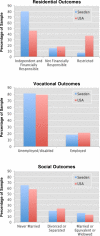Performance-based measurement of functional disability in schizophrenia: a cross-national study in the United States and Sweden
- PMID: 19487393
- PMCID: PMC3667206
- DOI: 10.1176/appi.ajp.2009.09010106
Performance-based measurement of functional disability in schizophrenia: a cross-national study in the United States and Sweden
Abstract
Objective: Recent advances in the assessment of disability in schizophrenia have separated the measurement of functional capacity from real-world functional outcomes. The authors examined the similarity of performance-based assessments of everyday functioning, real-world disability, and achievement of milestones in people with schizophrenia in the United States and Sweden.
Method: The UCSD Performance-Based Skills Assessment-Brief Version (UPSA-B) and a neuropsychological assessment were administered to schizophrenia patients living in rural areas in Sweden (N=146) and in the New York City area (N=244), and patients' functioning was rated by their case managers. Information from records and case managers was used to determine the frequency of living independently, working, and having ever experienced a stable romantic relationship.
Results: Performance on the UPSA-B was essentially identical in the two samples (New York, mean score=13.84; Sweden, mean score=13.30), as were scores on the case manager ratings of everyday activities (New York, mean=49.0; Sweden, mean=48.8). The correlations between UPSA-B score, neuropsychological test performance, and case manager ratings did not differ across the two samples. The proportion of patients who had never had a close relationship and the rate of vocational disability were also nearly identical. However, while 80% of the Swedish patients were living independently, only 46% of the New York patients were.
Conclusions: While scores on performance-based measures of everyday living skills were similar in people with schizophrenia across cultures, real-world residential outcomes were very different. These data suggest that cultural and social support systems can lead to divergent real-world outcomes among individuals who show evidence of the same levels of ability and potential.
Figures
References
-
- Velligan DI, Diamond P, Glahn DC, Ritch J, Maples N, Castillo D, Miller AL. The reliability and validity of the test of adaptive behavior in schizophrenia. Psychiatry Res. 2007;151:55–66. - PubMed
-
- Bellack AS, Sayers M, Mueser KT, Bennett M. An evaluation of social problem solving in schizophrenia. J Abnorm Psychol. 1994;103:371–378. - PubMed
-
- Keefe RSE, Poe M, Walker TM, Kang J, Harvey PD. The Schizophrenia Cognition Rating Scale SCoRS: Interview based assessment and its relationship to cognition, real world functioning and Functional Capacity. Am J Psychiat. 2006;163:426–432. - PubMed
-
- McKibbin C, Patterson TL, Jeste DV. Assessing disability in older patients with schizophrenia: results from the WHODAS-II. J Nerv Ment Dis. 2004;192:405–413. - PubMed
-
- Bowie DR, Reichenberg A, Patterson TL, Heaton RK, Harvey PD. Determinants of Real World Functional Performance in Schizophrenia: Correlations with Cognition, Functional Capacity, and Symptoms. Am J Psychiat. 2006;163:418–425. - PubMed
Publication types
MeSH terms
Grants and funding
LinkOut - more resources
Full Text Sources
Medical


